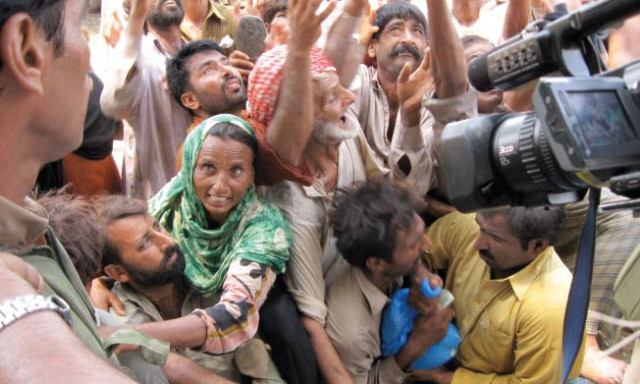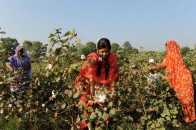While donations pour in, the need remains too great
A cargo truck with donations from Lahore is surrounded by people displaced by the floods in southern Punjab.

On the main road leading to Wasandaywali, a cargo truck with donations from Lahore is surrounded by people displaced by the floods in southern Punjab. The Pakistan Army, which has a camp at the site, has to control the crowd and the sight of the sticks troops wield is enough to stop a full-fledged riot from breaking out as dozens scramble for bottles of mineral water and bags of food.
The flood water surrounding the road is up to eight feet deep. The Pakistan Army is using boats to transport relief goods to nearby villages such as Kot Dadan, where people have chosen not to leave their houses – even if they have been destroyed – in order to safeguard precious livestock.
Too many mouths to feed
One of the boats carries relief goods brought by a group of people from Multan, who are disbursing food items and medicines worth Rs300,000. “We felt like we had to do something,” Mohammad Bilal says. “So about 10 of us got together and collected the money to buy this food.”
The packs they have prepared include rice, cartons of milk, water, sugar, lentils and medicines for malaria and fever.
As the boats get near, villagers waiting at banks wade into the water and desperately scramble to get hold of the bags being passed out to them. The melee like scene takes place in murky water, as the rickety boat is gripped by troops and villagers. This is an all too common a sight in southern Punjab as relief goods have become a holy grail of sorts for those in need.
While donations are pouring in from the Punjab, there are too many mouths to feed. Bags are split open in the process, villagers argue with each other, and women, children and men all clutch at the boat, begging for a pack to take back to their houses.
Not everyone is lucky enough to get one, though, and locals complain their share is being taken by outsiders.
“There are only two people here to get goods from this village, my brother and I. The rest of these people are all outsiders,” Mohammad Akram says, as he stands in the water. “There are 26 people in my house. I have seven children, and they are all sick. They complain of bad throats and fever.”
“Aid comes here two to three times a day. We then take it ahead to our houses.”
Medical assistance
Doctors have also been using the boat service to visit those who have not evacuated their houses. Fifteen doctors have visited the area in the past three days.
“We can’t go to a relief camp,” Akram’s brother tells The Express Tribune. “There are not enough relief goods on the road, and there is no camp close to our home.”
The sight on the roads – and in knee-deep water – is almost the same. Whether they have been rescued or are watching over their livestock, people are still dependent on the assistance.
In Jaalwali, another nearby village, dozens of children and men amass at the sound of a helicopter approaching. The sandstorm caused by its whirling vanes does not deter them as they reach out to receive the bags being dropped.
Those who are lucky clutch their bags and hurry home before they are snatched away again. The unlucky ones wipe off the dust – or dry themselves off – and wait for the next benefactor to arrive.
Published in The Express Tribune, August 23rd, 2010.


















COMMENTS
Comments are moderated and generally will be posted if they are on-topic and not abusive.
For more information, please see our Comments FAQ